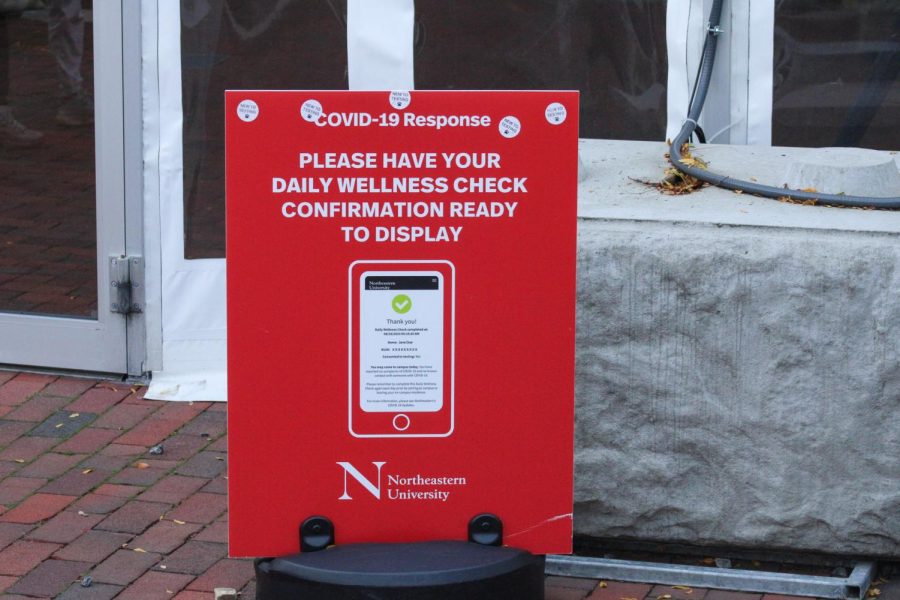Boston’s universities’ COVID-19 safety measures start well in fall semester, hope for future
Northeastern students, staff and faculty are required to be tested once a week, regardless of vaccination status.
November 17, 2021
As the 2021 fall semester continues, Northeastern University has aimed to put the worst of the pandemic behind it.
The university encouraged all students, including an over-enrolled freshman class, to return to campus in September with the promise that testing, vaccination requirements and other protocols would protect students.
But how is it going so far, and what are Boston College’s, Berklee College of Music’s and Boston University’s equivalent protocols?
Alessandro Vespignani is a data scientist, network modeller and Sternberg Family distinguished professor at Northeastern. Throughout the pandemic, he has provided advice and forecasting using computational models to the White House, the Centers for Disease Control and Prevention and international agencies like the World Health Organization. He has also provided advice to the university on its COVID-19 protocols.
“I have to congratulate the university for what they did,” Vespignani said. “They have set up an incredible machinery and infrastructure. Northeastern has always used the most aggressive policy, listening to science and developing an intensive testing program, with well informed and safe practices.”
“Students deserve credit too for observing these measures,” he said. “Throughout, everyone has doubted the students. ‘It won’t happen; it will be crazy.’ But students have been one of the most responsible sections of the community, welcoming and accepting the heavy burden these policies represent in their lives.”
The student perspective on the in-person experience at Northeastern is a predominantly positive one. Amr Mecca is a fourth-year political science student navigating the university’s COVID-19 health and safety system and said the weekly testing isn’t convenient but is efficient
“It’s a pain worth experiencing to be here on campus. The lines can be long in the testing center at peak times, but the process is quick, and it does add confidence that you’re healthy around campus,” Mecca said.
Henry Abrams, a third-year art and design student at Northeastern, echoed Mecca’s thoughts.
“I hated being online, so I’d have participated in a much more strenuous testing regime to be back here,” he said. “To be honest, I think Northeastern is doing a good job.”
Boston’s higher educational institutions have all been implementing their own safety measures to return to in-person classes this fall. Katherina Niedzwetzki, a third-year music and business student at Berklee, described a very similar set of COVID-19 safety protocols at her school.
“We get tested every week and have to wear masks for classes,” Niedzwetzki said.
Berklee, however, requires proof of a negative test before entry into all college buildings, whereas students at Northeastern are supposed to complete the Daily Wellness Check before coming to campus. In reality, participation or results are not checked before entry into campus sites other than access to gyms, such as the Marino Recreation Center.
Boston College has enacted various measures to protect its students on campus.
“The university has been relaxed about wearing a mask around campus. We don’t have to wear a mask in classes unless the professor asks or advises us to. Everyone has to be vaccinated, but there is no specification on which one,” said Fran Hsu, a third-year business student at Boston College. “I don’t agree with everyone having to be vaccinated to attend the university. I would have preferred a mask mandate.”
At Boston College, students are required to adhere to similar COVID-19 health and safety requirements. This includes wearing face coverings, participating in testing, monitoring daily symptoms and following physical distancing requirements and gathering size limitations.
“So far with testing, I think it’s going really well. I get tested regularly, once a week,” Hsu said. “The university has done a good job of making it feel as normal as possible.”
David Hamer, a professor of global health and medicine at Boston University, has worked on the university’s COVID-19 health and safety plan since April 2020. He said Boston University has implemented a vaccine mandate for all faculty, staff and students, with allowance for religious and medical exemptions, and mandatory testing once a week, utilized more frequently in specific contexts of exposure — the same measures as Northeastern.
The heads of student health services Boston, Harvard, Northeastern and Tufts University’s and MIT meet every two weeks, and this sharing of expertise has been “crucial” to success so far, Hamer said.
“There are many things to be gained from sharing information and comparing strategies,” Hamer said. “For example, ideas for developing testing regimes were born from collaboration, and vaccine mandates were a shared decision.”
Hamer suggested that Boston University has benefitted from “a combination of success stories” so far; for example, developing an effective contact tracing team or, according to Hamer, optimizing all building filtration and air systems. But challenges persist.
“Collecting vaccine information has been tough, as well as maintaining the levels of enforcement over time to ensure students and others remain in compliance, make their testing appointments, and don’t get apathetic,” he said.


















